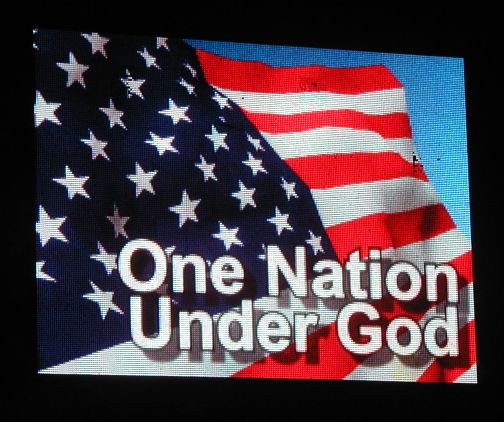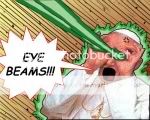What Part of No Don't You Understand? What Part of Fairness? Of Constitution?!
The Parts That Hate the Baby Jesus!

Christ in a Full House trumps all, Judges wild.
Judge Upholds Prayer Limits in Ind. State House
from The Washington Post
CHICAGO -
 In a spirited duel over prayer, members of the Indiana state House are at odds with a federal judge who ruled that the daily invocation appeals too often to Jesus Christ and a Christian god.
In a spirited duel over prayer, members of the Indiana state House are at odds with a federal judge who ruled that the daily invocation appeals too often to Jesus Christ and a Christian god.The "systematically sectarian" prayers, U.S. District Judge David F. Hamilton concluded, are barred by the Constitution, which forbids the government to show preference for any religious denomination. He ordered the House to avoid mentioning Christ in the formal benedictions.
As the House prepares to open its 2006 session on Wednesday, a number of politicians have vowed to defy Hamilton, whom they accuse of undermining a 188-year Indiana tradition and interfering in legislative branch affairs.
Terry Goodin, a Democrat who rejects Hamilton's order, is among at least two dozen House members who have asked to give Wednesday's prayer. He said he would "absolutely" speak Christ's name if given the chance.
"Really, who do you pray to? If you're offering up a prayer, you're praying to a deity. You don't offer prayers to just an open space," Goodin said. "I will give the same type of prayer that's been given for 100 years. I won't change my words because of someone in the judicial branch who tells me I must."
Hamilton
 expects House leaders, including Speaker Brian Bosma (R), who is appealing the decision to the U.S. Court of Appeals for the 7th Circuit in Chicago, to honor the injunction. If they do not, the judge said, he intends "to take appropriate steps to insure compliance."
expects House leaders, including Speaker Brian Bosma (R), who is appealing the decision to the U.S. Court of Appeals for the 7th Circuit in Chicago, to honor the injunction. If they do not, the judge said, he intends "to take appropriate steps to insure compliance.""If the Speaker or those offering prayers seek to evade the injunction through indirect but well understood expressions of specifically Christian beliefs, the audience, the public, and the court will be able to see what is happening," Hamilton, the son and grandson of Methodist ministers, warned in a Dec. 28 ruling rejecting a rehearing.
Bosma, who has termed Hamilton's injunction "intolerable," said Friday that he intends to arrange prayers that comply with Hamilton's ruling while the case is on appeal.
Hamilton studied as many invocations as he could find from the 2005 legislative session and concluded that a substantial majority were "explicitly Christian in content." He said they represent "a clear endorsement of Christianity, sending the message to others that they are outsiders and the message to Christians that they are favored insiders."
Of 53 prayers, nine were delivered by lawmakers and 41 by clergy identified with Christian churches. A Muslim imam and a Jewish rabbi each gave one prayer. A majority mentioned Christ.
On Feb. 28, for example, the prayer leader read from Paul's letter to the Colossians, saying, "Whatever you do in word or deed, do all in the name of the Lord Jesus, giving thanks through him to God the Father."
Hamilton interpreted a March 28 prayer as a call to worldwide Christian conversion.
"We
 look forward to the day," the speaker said, "when all nations and all people of the earth will have the opportunity to hear and respond to messages of love of the Almighty God who has revealed himself in the saving power of Jesus Christ."
look forward to the day," the speaker said, "when all nations and all people of the earth will have the opportunity to hear and respond to messages of love of the Almighty God who has revealed himself in the saving power of Jesus Christ."No other specific religious faith was invoked or endorsed by the speakers, Hamilton said. In contrast to the majority of the Christian prayers, Hamilton said, the imam's March 8 words were inclusive and were "not identifiable as distinctly Muslim."
It was Clarence Brown's energetic rendition of "Just a Little Talk With Jesus" that prompted several legislators to decide enough was enough. The Indiana Civil Liberties Union soon filed suit in the name of four people - a Quaker, a Methodist and two Catholics - to stop what critics considered an increasingly sectarian prayer practice.
Brown, 51, is an evangelical Christian layman who works in an auto parts factory 70 miles south of Indianapolis. Invited to give a prayer to open the April 5 House session, Brown said he was thinking about the separation of church and state as he drove to the state Capitol.
He said he talked with God during the ride and decided to speak up for the man he considers his savior. "I wanted to share the word. That's what I'm supposed to do," Brown said. "I have to do what Jesus Christ says for me to do as a witness."
Brown's prayer included thanks to God "for our lord and savior Jesus Christ, who died that we might have the right to come together in love." When the prayer was finished, Bosma announced that Brown would "bless us with a song."
As Brown led the rollicking tune, some members and staffers clapped and sang along.
Several others left the chamber.
"We're
 just increasingly sensitive to both religious partiality in general and to evangelical Christianity's attempt to be politically and culturally aggressive," said George Washington University law professor Ira Lupu. "Both of those things are going on in that Indiana setting."
just increasingly sensitive to both religious partiality in general and to evangelical Christianity's attempt to be politically and culturally aggressive," said George Washington University law professor Ira Lupu. "Both of those things are going on in that Indiana setting.""In general, politicians think that the public wants to hear more explicitly religious messages," said Barry Lynn, executive director of Americans United for Separation of Church and State, a liberal lobbying group. "It is much more appropriate for people who have a shared religious belief system to get together before they walk into the chambers of the city council or the state legislature and do their worship before they go about their official business."
That is not how a vocal group of Indiana legislators see the issue. Unlike on some fronts in the culture wars, elected Democrats and Republicans have come together to criticize Hamilton's ruling.
"I see where religions were forbidden in other countries. In communist countries. In totalitarian countries. I think this smacks of that," said Rep. B. Patrick Bauer (D), the House minority leader and former speaker. "We need a clarification or we need a correction."
Goodin
 objected to the lawsuit and to those who filed it. "I'm a traditionalist," he said. "I felt like if there's a reason to change tradition, there ought to be a real reason, not that someone may say they're offended. To me, it sounds like they were the ones who were closed-minded."
objected to the lawsuit and to those who filed it. "I'm a traditionalist," he said. "I felt like if there's a reason to change tradition, there ought to be a real reason, not that someone may say they're offended. To me, it sounds like they were the ones who were closed-minded."



























0 Comments:
Post a Comment
<< Home